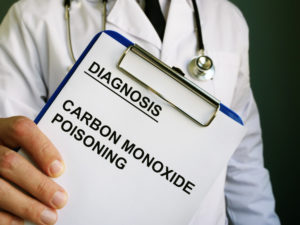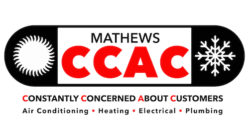
Since CO is an odorless and invisible deadly gas, knowing the five early signs of carbon monoxide (CO) exposure could prevent a tragedy. They include:
-
- Sleepiness or fatigue
- Headache
- Shortness of breath
- Dizziness
- Nausea
Other signs of moderate to severe exposure include confusion, vomiting, lack of coordination, or unconsciousness. One way to check your symptoms is to go outside or leave the area. If you start to feel better, your home or immediate environment may have unhealthy CO levels.
Protection from CO
CO detectors are the only way to tell if your home has high levels. A CO detector at each level of your home and in each bedroom wing will alert you to the buildup of hazardous gases. CO is lighter than air, so the alarm should be placed at eye level or higher. The detectors can be battery-operated or hard-wired.
Prevention of CO Formation
You can prevent a dangerous buildup by having your gas-burning appliances professionally maintained routinely. The pros at Mathews CCAC always check CO levels when servicing gas furnaces. Gas water heaters and dryers also create CO and must be ventilated to the outdoors for your safety. Appliance pros use meters to measure the amount of this toxic gas in the air. They will check the venting to make sure it’s unobstructed.
When using CO-emitting devices outdoors, use them away from open windows and doors. Never use a charcoal or gas grill indoors. If you’re boating, avoid sitting on or standing near a running motor. Avoid sitting in idling vehicles, and don’t run one in an enclosed space without adequate ventilation.
Preventing carbon monoxide poisoning is possible through early detection and routine maintenance. To learn more, contact the pros at CCAC, providing HVAC services for Coastal Bend homeowners since 1979.












